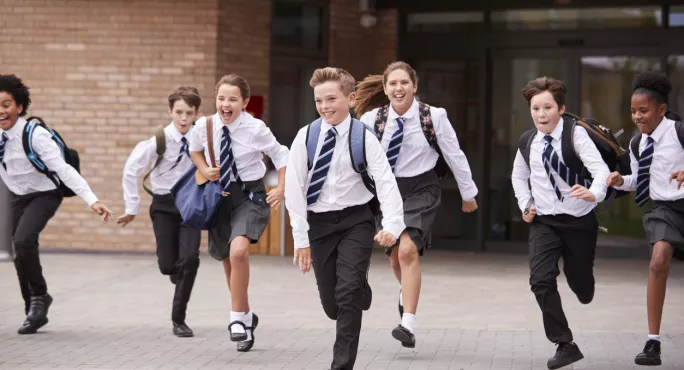- Home
- Breaktimes: More than just letting off steam?
Breaktimes: More than just letting off steam?

Lunchtimes and breaktimes are universal across school life, providing unstructured, (usually) outdoor, activity with relatively little adult guidance.
It’s also a good chance for teachers to get some fresh air, stretch their legs and get something to eat.
Research, though, seems to suggest that time given to breaks like these are diminishing - for several reasons - and with potentially negative consequences for pupils.
Diminishing breaks
The most recent data on breaktime comes from a 2019 Nuffield Foundation report by Ed Baines and Peter Blatchford of the UCL Institute of Education. This followed up on their earlier work from 1995 and 2006 charting the use of breaktimes in primary and secondary education.
Overall, the research found that breaktimes have decreased in duration for younger children by around 45 minutes per week and older children by around an hour.
The shortest breaktimes were found to be for children in urban primaries, or with high numbers of free school meals. Similar disparities are also seen in the US, where black and Latinx children have reduced access to breaks (London, R, 2019).
Breaktime reduction is usually reported to allow more time for learning and teaching, and to limit opportunities for poor playground behaviour.
Another important finding by Baines and Blatchford, not included in previous reports, was that 60 per cent of schools said that children may miss a whole lunch or breaktime, either for disciplinary reasons or to catch up on lessons.
Rebecca London’s US study (2019) reported that the threat of losing breaktime was said to be the best way of keeping students’ behaviour in check.
Fresh air and fun
However, there is a gathering collection of research suggesting that breaktimes fulfill a role far greater than just letting off steam.
We know that breaktimes that are well-organised with activities, but not firmly structured, can offer opportunities for children to develop their social and emotional skills.
Children are able to manage relationships, create imaginative play, and develop their capacity for empathetic responses towards others. All of these skills are also associated with academic achievement.
Most teachers replying to Baines and Blatchford also said that breaktimes provided important opportunities for students to get some exercise and fresh air. However, only primary teachers really endorsed the idea that playtimes were also important for social opportunities.
Playtime for all?
In contrast, children tell us that they value breaktimes as a chance to catch up with friends, and to have the opportunity to do what they wanted to do with their time.
Breaktimes can also be a rich environment for peer interaction, and Baines and Blatchford suggest that students’ need to spend time with friends may only increase as they progress through their education.
The majority of children surveyed said that they wanted more breaktime, and more than 80 per cent of children said that they had missed playtime, either to finish work, or as a consequence of a whole class punishment.
While 90 per cent of students say that they like breaktimes, especially the longer lunchtime break, a small percentage said they don’t like breaks, replicating work by Maria Mroz and Pamela Woolner published earlier in 2019. While this is a fraction of the total, their reasons for not enjoying breaktime are important, often citing problematic behaviour, or friendship issues - something teachers should be aware of.
Future play
Overall, the Nuffield report suggests that we might need to think more about how breaks might integrate with the broader aims of education.
The opportunity to form less formal relationships with adults and peers across year groups, to take part in enjoyed and different activities, and to be in situations that require social and emotional problem-solving skills are all important components of a positive school climate.
Dr Alice Jones Bartoli is director of the Unit for School and Family Studies at Goldsmiths University of London, and editor-in-chief of the British Journal of Educational Psychology
Keep reading for just £1 per month
You've reached your limit of free articles this month. Subscribe for £1 per month for three months and get:
- Unlimited access to all Tes magazine content
- Exclusive subscriber-only stories
- Award-winning email newsletters

